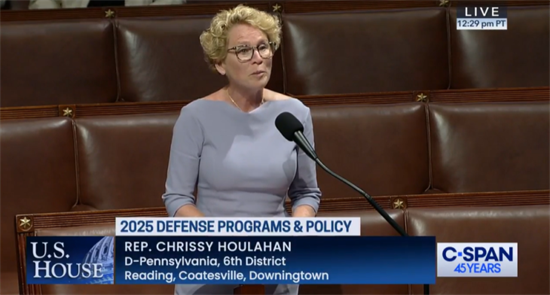Partisan Amendments Lead to Controversial NDAA Vote
Washington,
June 18, 2024
Tags:
National Security
Originally published in My ChesCo.
Written by Maryann Pugh. WASHINGTON, D.C. — On Friday, Representative Chrissy Houlahan (D-PA), the Ranking Member of the House Armed Services Committee’s military Quality of Life Panel, cast a vote against the National Defense Authorization Act (NDAA) after partisan amendments were added. The House approved the $895.3 billion bill by a vote of 217 to 199, largely along party lines. Houlahan expressed her disappointment in a statement following the vote. “It’s enormously disappointing to see the bipartisan bill that we passed out of committee 57-1 become overrun with partisan amendments that restrict reproductive freedoms, attack LGBTQ+ service members, leave our NATO allies behind, ignore the threat of climate change, and more. Our military families deserve better than this political theatre,” she said. The Controversial Amendments The contentious amendments impacted several areas:
These amendments shifted what was initially a widely supported bill into a deeply divided one. Quality of Life Recommendations Despite voting against the overall bill, Houlahan highlighted the positive aspects that emerged from the Quality of Life Panel’s work. “For months, my Republican and Democratic colleagues and I on the Quality of Life Panel worked together to propose 31 recommendations to improve compensation, housing, child care, health care, and spouse employment. I’m thrilled all 31 recommendations made it in the House-passed bill,” she stated. These recommendations aim to enhance the well-being of military personnel and their families. They include improvements in:
Legislative Process Continues Houlahan remains hopeful about the bill’s future. “While I’m enormously disappointed the bill has taken a partisan turn, I have full faith and confidence that the final bill will be stripped of these ridiculous and harmful amendments,” she said. She compared the current situation to the legislative process explained in Schoolhouse Rock, emphasizing that the process is far from over. The NDAA will now move to the Senate, where a different version of the bill will likely be crafted. Houlahan looks forward to negotiating with Senate counterparts to produce a final, bipartisan bill for President Joe Biden to sign. Balancing Military Might and Political Fights The NDAA is crucial as it sets Pentagon policy and guides defense funding for the coming year. The bill’s approval is essential for maintaining military readiness and supporting service members. However, the inclusion of divisive amendments highlights the ongoing struggle between ideological factions within Congress. The partisan divide over the NDAA has significant implications. It affects how the U.S. military operates, the support provided to service members, and broader national security policies. The amendments in question also touch on sensitive social issues, reflecting the broader cultural and political battles within the country. Paving the Path to Unity or Gridlock? If the Senate removes the controversial provisions, it could pave the way for bipartisan support and ensure that vital defense programs and military support initiatives proceed without delay. Conversely, if divisive elements remain, it could lead to further gridlock and uncertainty. In summary, the House’s approval of the NDAA amid partisan conflict underscores the complexities of passing major legislation in a divided government. The next steps in the Senate will be critical in determining whether a consensus can be reached to support the nation’s defense priorities while addressing the concerns raised by lawmakers like Houlahan. |
In the News



